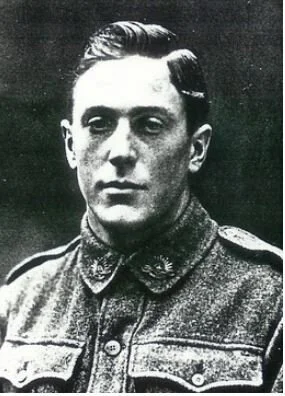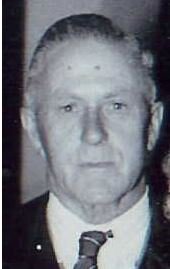Rank: Lance Corporal
Regimental Number: 3376
Place of Birth: Port Adelaide South Australia
Address: 19 Glyde Street(WW1: 41), East Fremantle, Western Australia
Next of Kin: Father, A Jackson
Enlistment Date: 26 July 1915
Unit Name: 51st Battalion
Age embarkation: 29
Marital Status: Single
Occupation: Horse driver
History
ERNEST ALEXANDER JACKSON
(1892-1975)
Ernest ‘Ernie’ Alexander Jackson, (service number 3376) was awarded a Military Medal for his courageous acts during World War l.
He was the firstborn of 7 siblings; his father Alexander Melmoth Jackson, and his mother, Mary Ann Elizabeth Gibson, lived in Port Adelaide, South Australia. The family moved to Western Australia around 1896 and lived at 41 Glyde St (now no. 19) East Fremantle, where 5 of his siblings were born. He worked as a horse driver in Fremantle prior to his enlistment with two of his brothers, Harold Melmoth Jackson (16th Battalion (killed) and Roy Melmoth Jackson (15th Battalion) (Reference).
In July 1915, Ernest enlisted in the Australian Imperial Force (AIF) at the age of 23, where he was assigned into the 11th Infantry Battalion reinforcements, the first ever Battalion recruited in Western Australia. (Reference). The battalion was raised within weeks of the declaration of war in August 1914 and embarked for overseas after just two weeks of preliminary training.
He embarked on the HMAT Ulysses A38 from Fremantle on 2nd Nov 1915 and arrived in Egypt on the 26th Nov (Reference). Subsequently, the 11th Battalion was heavily involved in defending the front line of the ANZAC beachhead and served at ANZAC until evacuation in December.
After the withdrawal from Gallipoli, the 11th Battalion returned to Egypt. It was split to help form the 51st Battalion...(Reference) In March 1916, this battalion sailed for France and the Western Front. From then until 1918, the battalion took part in bloody trench warfare. Its first major action in France was at Pozieres in the Somme valley in July. (Reference)
Within a fortnight of arriving in France, the 51st Battalion launched an attack at Mouquet Farm, and suffered casualties equivalent to a third of its strength. After Mouquet Farm, the battalion, alternated between front-line duty, training and labouring behind the line throughout the winter of 1916-17, and in early 1917, took part in the advance that followed the German retreat to the Hindenburg Line, attacking Noreuil in April, a fortified village used to delay the Australian advance. Later in the year, as the focus of the AIF's operations shifted to the Ypres sector in Belgium, the Battalion engaged in the battle of Messines between 7 and 12 June. (Reference).
Just before the battle of Polygon Wood between 26 and 27 September, Private Ernest A. Jackson suffered from severe Pyrexia (High temperature) of unknown origin, and was sent to Alexandria Hospital in England to recuperate before rejoining his unit in December 1917. (Reference) (Reference)
Following the collapse of Russia in October 1917, the Germans began a series of Offensives on the Western Front in France. The 51st Battalion assisted in the repulse of a large German attack on 5th April, launching a critical counter-attack. (Reference). On the evening of the 24th of April, the 51st Battalion and 52nd Battalion of the 13th Brigade (about 1500 men), planned to encircle and trap the Germans, around the village of Villers-Bretonneux, in the dark of night. (Reference)
The Germans, however, detected the movement and swiftly launched a counter-attack, turning the operation into a gravely dangerous situation. Captain Robert Forsyth, medical officer of the 52nd Battalion, recalled:
“… an officer shouted 'Still!' I could see a long single line of men standing motionless as far as I could see in either direction, and, as the light faded, the darkness in front started to tap, tap, tap, and bullets whistled round and the line shuffled forward with rifles at the ready like men strolling into fern after rabbits. The whistle of bullets became a swish and patter, and boys fell all ‘round me, generally without a sound.”
[Forsyth, quoted in Charles Bean, The Australian Imperial Force in France during the Main German Offensive, 1918, Volume V, The Official History of Australia in the War of 1914–1918, Sydney, 1941, p.582]
Along with some British battalions, the job of retaking Villers-Bretonneux was assigned to two Australian brigades of the 4th and 5th Divisions—the 13th, commanded by Brigadier-General William Glasgow, and the 15th, commanded by Brigadier-General Harold 'Pompey' Elliott.
Private Ernest A. Jackson played a significant part in the planning and coordination of the night attack by risking his life through German heavy machine guns and shell fire that felled many, to carry messages between the Brigades and the Forward Brigade Station along with a comrade, Private Samuel Royston Brown. His contribution resulted in the well coordinated night attack to successfully recapture the town from the Germans despite the gravity of the situation, and was later nominated along with his comrade to receive a Military Medal.
“On night 24/25th April 1918 during a counter-attack by the Battalion on a strong enemy position south of VILLERS-BRETONNEUX those two men, who are Battalion Runners, continually carried messages through heavy machine gun and shell fire to the Company’s and Forward Brigade Station. When other communications failed they were ever ready to carry messages regardless of their own personal safety. Their coolness and courage throughout the operation were conspicuous.” (Reference)
Private Ernest A. Jackson received the Military Medal - for Bravery in the Field- on the 1st of May 1918, and was given the rank of Lance Corporal shortly after, before being discharged on the 3rd of June 1919.
He returned to Fremantle and was recorded as living at various addresses around East Fremantle: from 1922-25 at 76 Duke St Fremantle and from 1925-34 at Silas St East Fremantle.
In 1934 he married widower, Ivy May Jardine (nee Rundell 1894-1981), who had lost her first husband two years earlier. (Reference)
1932 Death on September 8, at Cottesloe, Robert JARDINE, dearly loved husband of Ivy May Jardine, of 16 Palmerston-street, Buckland Hill, and loving father of Joyce, Roma and Robert ; aged 39 years. (reference)
He subsequently lived at her home- 16 Palmerston Street, Buckland Hill from 1936-1963.
In 1975 Ernest died, at the age of 82, and was buried in the Garden Of Remembrance at Karrakatta Cemetery (Section EC Site 4 Position 0133). He is also commemorated on the East Fremantle Municipality Roll of Honour.
Ivy died in September 1981 and was buried with Ernest at Karrakatta.
Researched and written by Xing Yun Lee for www.streetsofeastfreo
1918 Mr. and Mrs. A. Jackson, of 41 Glyde street, East Fremantle, have received word that their son, Private E. Jackson, has been awarded the Military Medal. (reference)
1919 Soldiers And Sailors: Mr. and Mrs. A. M. Jackson, of 41 Glyde-street, East Fremantle, have been informed by the Base Records Office, Melbourne, that their son, Lance-Corporal E. Jackson, M.M., 51st Battalion, is expected to arrive home early in April, having left England on February 28. He has had three years and four months' active service in Egypt and France. (reference)












